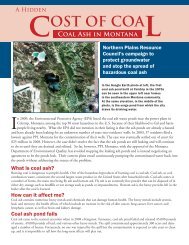Summer - Northern Plains Resource Council
Summer - Northern Plains Resource Council
Summer - Northern Plains Resource Council
You also want an ePaper? Increase the reach of your titles
YUMPU automatically turns print PDFs into web optimized ePapers that Google loves.
Much work remains<br />
on Farm Bill: Big Ag<br />
trying to dominate<br />
land and water<br />
Popular headlines praise the<br />
Senate’s bipartisanship in<br />
passing the 1,000-page 2012<br />
Farm Bill. Here’s what the Senate<br />
and House Agriculture Committees’<br />
versions of the Farm Bill mean for<br />
Montana’s farmers, ranchers, and<br />
consumers (so far).<br />
Direct payments to farmers are<br />
ended, though most of those funds<br />
have merely been rechanneled<br />
through other programs. The<br />
House Ag Committee and full<br />
Senate versions vary widely, with<br />
the Senate’s version directed more<br />
toward closing loopholes and limiting<br />
commodity payments, and the<br />
House Ag Committee version leaving<br />
loopholes “that allow mega farms<br />
with reasonably good accountants<br />
and lawyers to collect unlimited<br />
payments,” according to the National<br />
Sustainable Agriculture Coalition.<br />
The Environmental Quality<br />
Incentives Program (EQIP), a<br />
program seen as a target for budget<br />
cuts, was re-funded and expanded.<br />
This program provides<br />
incentives to farmers and<br />
ranchers making a living<br />
on a family scale.<br />
However, organic<br />
farmers are eligible<br />
for only a fraction of<br />
the payments that other<br />
farmers, and even confined<br />
animal feeding operations, can<br />
receive.<br />
Very large cuts to the Supplemental<br />
Nutritional Assistance Program<br />
(SNAP, formerly the Food Stamp<br />
program) in the House bill will cause<br />
two to three million Americans to lose<br />
food assistance in these hard times.<br />
Meatpacker monopoly<br />
Neither version of the Farm Bill<br />
does much at all to address the<br />
meatpacker monopoly in livestock<br />
markets. Monopolistic conditions<br />
leave ranchers with no real market for<br />
selling and leave consumers with little<br />
choice as to what they put into their<br />
mouths. Whatever ranchers are paid,<br />
What's next?<br />
As this edition of The <strong>Plains</strong><br />
Truth is going to press, the<br />
August recess approaches and<br />
time ticks toward the Farm<br />
Bill’s September 30 expiration<br />
date. There are abundant<br />
differences between the House<br />
and Senate versions of the<br />
bills that call for citizens to be<br />
heard.<br />
The Western Organization of<br />
<strong>Resource</strong> <strong>Council</strong>s will send an<br />
email Action Alert to help you<br />
make your voice heard… watch<br />
your In-box.<br />
it is less than they would be paid in a<br />
competitive marketplace.<br />
<strong>Northern</strong> <strong>Plains</strong>’ Agriculture Task<br />
Force members have fought for<br />
years to loosen the stranglehold that<br />
producers of technology, seed, and<br />
institutional knowledge have over the<br />
farmers and ranchers making a living<br />
by producing food. A handful<br />
of companies sell the inputs<br />
farmers and ranchers need,<br />
and a mere handful<br />
buy what farmers<br />
and ranchers<br />
produce.<br />
In an ongoing effort<br />
to undermine familyscale<br />
producers and to restrict<br />
information available to consumers,<br />
the House language pressures Ag<br />
Secretary Vilsack to agree officially<br />
with the World Trade Organization’s<br />
declaration that country-of-origin<br />
labeling for meat is a fair trade<br />
impediment.<br />
Additionally, GIPSA (Grain<br />
Inspection, Packers and Stockyards<br />
Administration) rules that address<br />
contract fairness are also under attack.<br />
And Big Ag is pushing for a rider in<br />
the House bill to abolish the already<br />
weak approval process for genetically<br />
modified crops.<br />
– Kelsey Miller<br />
This radiant star could be yours!<br />
Look for a color photograph of this quilt in your mailbox in September. This<br />
handsome “radiant star” quilt was hand-sewn by Donna Yarger of Circle.<br />
It will be raffl ed off to support the work of our Agriculture Task Force.<br />
We will draw the winning ticket at the <strong>Northern</strong> <strong>Plains</strong> Annual Meeting in<br />
November. Tickets will be available for $10 each or three for $25.<br />
If you want to see it in person, stop by our Home on the Range, 220 South<br />
27th Street, Billings. We will also display it at some of our upcomng events.<br />
Montana’s Public Service<br />
Commission (PSC) has<br />
denied a NorthWestern<br />
Energy petition for a three-year waiver<br />
from the “community provision” of<br />
the state’s renewable energy standard.<br />
The Commission on June 1 instead<br />
granted the utility a one-year waiver,<br />
and reiterated its obligation to meet<br />
the requirements by 2013.<br />
The state’s renewable energy standard,<br />
enacted by the Legislature in 2005,<br />
requires all regulated public utilities<br />
in the state to acquire at least 15% of<br />
their retail electrical sales from new<br />
renewable sources, such as wind and<br />
solar, by the year 2015. It also requires<br />
a certain portion of that energy come<br />
from small projects that are at least<br />
partially locally owned, community<br />
renewable energy projects (CREPs).<br />
This is the community provision.<br />
NorthWestern is on track to meet the<br />
overall target by 2015, but has fallen<br />
short in its attempt to procure the<br />
required 44 megawatts from CREPs.<br />
In its findings, the PSC stated that<br />
NorthWestern had not fully justified<br />
that it had taken “all reasonable steps”<br />
to acquire those energy projects into<br />
– Kelsey Miller<br />
Board grants NorthWestern<br />
one-year ‘community’ waiver<br />
2013 and 2014. It did, however,<br />
acknowledge that the utility faced<br />
circumstances beyond its control in<br />
2011 when two projects it had sought<br />
to bring on-line fell through. In its<br />
ruling, the PSC said that, despite the<br />
setbacks in 2011, the utility could have<br />
been planning on compliance in 2013<br />
and 2014. As some noted, planning<br />
for compliance would have been far<br />
more prudent for NorthWestern<br />
than spending resources in a fruitless<br />
attempt to have this section of the law<br />
repealed by the 2011 Legislature.<br />
“Planning for power generation is a<br />
lengthy process,” said PSC Vice Chair<br />
Gail Gutsche. “NorthWestern Energy<br />
is responsible for taking all reasonable<br />
steps and making adequate preparation<br />
to comply with the CREPs standard.<br />
The bar is high, and they failed to<br />
meet it for 2013 and 2014.”<br />
The utility now has until the end<br />
of 2013 to fulfill its community<br />
provision requirements. If it is not<br />
able to comply, it will face a penalty<br />
of $10 per megawatt-hour, paid for by<br />
NorthWestern’s shareholders (rather<br />
than its ratepayers).<br />
– Clayton Elliott<br />
The <strong>Plains</strong> Truth <strong>Summer</strong> 2012 Page 13





